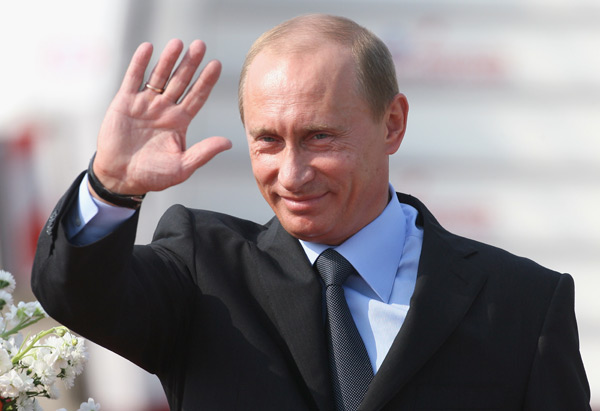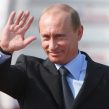
Germany Awards Putin the “Enough-is-Enough” Prize
Publication: Eurasia Daily Monitor Volume: 8 Issue: 139
By:

Until July 16, Prime Minister Vladimir Putin had every reason to believe that his plan for moving back to the Kremlin for the third presidential term is not only unassailable inside the country, but also perfectly fine with Russia’s key international partners. There is no end to the volunteers eager to join his Popular Front individually or collectively with organizations like the Union of Beekeepers, so he has only to regulate this traffic. Western peers show him every respect due to the master of Russian politics, who has the measure of all other politicians, including President Dmitry Medvedev, and enjoys cutting them down to size. The decision of a German Werkstatt Deutschland committee to award Putin the annual Quadriga prize for building stability in Russia “through the interplay of prosperity, economics and identity” had appeared a due recognition of his unique “staying power” – until the embarrassed committee announced the cancellation of the 2011 award (Kommersant, RIA Novosti, July 16).
Among the former recipients of Quadriga, which commemorates German reunification, are Helmut Kohl, Gerhard Schroeder, Recep Tayyip Erdogan, and Viktor Yushchenko, so Putin feels that he belongs to this distinguished company, with the obvious exception of the latter (www.lenta.ru, July 11). The committee is a particularly motley crew of ministers, entrepreneurs, academics and human rights activists, and Russian liberal commentators were inclined to interpret the award as yet another sign of German readiness to embrace Putin obnoxious as he is as long as the much-valued natural gas keeps coming in (Moskovskiy Novosti, July 15; Ezhednevny Zhurnal, July 13). Germany is indeed notorious for its eagerness to accommodate every capricious turn in Putin’s policy from the phobia to NATO enlargement to the vindictive persecution of Mikhail Khodorkovsky, but in this case the usual hypocrisy has been swept away by a storm of indignation. So many German opinion-makers found it opportune to say what they really think about Putin’s travesty of democracy that the committee could not defend the integrity of its decision (www.gazeta.ru, July 16).
What elevates the scandal to a political message is its timing: on July 18, Medvedev travelled to Hannover for the German-Russian summit traditionally co-located with a bilateral forum of entrepreneurs. Chancellor Angela Merkel knows both Putin and Medvedev too well to place any expectations on the latter and rather prefers not to cultivate any personal chemistry with him, unlike for that matter US President Barack Obama who has invested much effort in engaging Medvedev with the “reset” policy (Moskovsky Komsomolets, July 18). Merkel is also aware that the attitude among German business leaders to investing in Russia has been changing from moderately positive to deeply skeptical as they become frustrated with the rampant corruption and predatory bureaucracy. As for the gas business, E.ON and other German champions now assume that they are in a position to put pressure on Gazprom to lower prices, particularly as the Russian behemoth wants to expand in the German power-generating sector (Nezavisimaya Gazeta, July 18; RBC Daily, July 15).
Merkel made sure that her face-to-face meeting with Medvedev was perfectly civil and as content-free as any other high-level EU-Russia meeting in the past year –when it transpired that the “partnership-for-modernization” project is not going anywhere (Nezavisimaya Gazeta, July 19). Putin, however, is hardly any less irked by this indifferent civility than he is vexed by the Quadriga affair, which his press-secretary Dmitry Peskov described as an “odd shambles” that had left his boss “somewhat puzzled” (Kommersant, July 18). The problem, however, clearly is not with the unfortunate committee but with the German political class, which has sent Putin the “enough-is-enough” message in no uncertain terms. All the diplomatic reassurances that the scandal would have no implications whatsoever for the German-Russian partnership, could not hide the shock on the receiving side of this message.
Germany is definitely a very special country for Putin who has spent much time and fortune recruiting particular friends such as Schroeder and building networks of well-paid sycophants that should have secured him a gracious public profile. As with any over-staying autocrat, he convinced himself that his reputation of a benevolent statesman is insuperable and Medvedev’s feebleness makes him a true decider in comparison. Even astute commentators like Fyodor Lukyanov argued that the West is tired of the ambivalence of Russia’s split leadership and would welcome the certainty of Putin’s firm hand on the helm (www.gazeta.ru, July 14). Germany is central to this wishful perspective, and Putin has presumed that only the gas transit-disturbing Ukraine stands in the way, but the opening of the Nord Stream pipeline would minimize this irritant and open an era of beautiful friendship.
What Putin finds hard to grasp is that for Germany that has to focus on rescuing Greece from the looming default, and on finding a common denominator for the disarrayed EU economic policy (and keeping the domestic party-political coalition together) Russia has slipped down the list of priorities. Were Russia ready to contribute to the rescue-package for Greece, or to play along in sorting out the Libyan debacle, or at least to help Ukraine in climbing out of the financial mess instead of pushing it deeper into it, Germany would find it worthy of a serious conversation. As things stand now on Putin’s watch, there is a problem with finding a topic for the annual consultations.
Putin never forgets an insult, but that does not mean he understands the German message; at least while making an electoral tour of the Magnitogorsk plant he informed workers that the key qualities for a president were honesty and decency – which he probably possesses in some quantities (Kommersant, July 16). The “time-to-go” message needs elaboration that would cut through layers of political correctness and propaganda of the joys of marching together, but Russian voters are expressing much the same attitude as the German anti-Putinists by taking their money and their children out of the country before switching the lights off. Putin certainly remembers the exodus in the last year of East Germany’s existence, and he also knows that enough obstinates stayed, including one Angela Merkel, to say irrefutably: “We are the people!”




